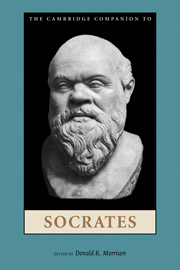Book contents
- Frontmatter
- 1 The Rise and Fall of the Socratic Problem
- 2 The Students of Socrates
- 3 Xenophon and the Enviable Life of Socrates
- 4 Socrates in Aristophanes’ Clouds
- 5 Socrates and the New Learning
- 6 Socratic Religion
- 7 Socrates and Democratic Athens
- 8 Socratic Method
- 9 Self-Examination
- 10 Socratic Ignorance
- 11 Reconsidering Socratic Irony
- 12 Socratic Ethics and the Socratic Psychology of Action
- 13 Socrates and Eudaimonia
- 14 Socrates’ Political Philosophy
- 15 Socrates in Later Greek Philosophy
- Socrates Bibliography
- Index of Names and Subjects
- Index of Passages
8 - Socratic Method
Published online by Cambridge University Press: 28 March 2011
- Frontmatter
- 1 The Rise and Fall of the Socratic Problem
- 2 The Students of Socrates
- 3 Xenophon and the Enviable Life of Socrates
- 4 Socrates in Aristophanes’ Clouds
- 5 Socrates and the New Learning
- 6 Socratic Religion
- 7 Socrates and Democratic Athens
- 8 Socratic Method
- 9 Self-Examination
- 10 Socratic Ignorance
- 11 Reconsidering Socratic Irony
- 12 Socratic Ethics and the Socratic Psychology of Action
- 13 Socrates and Eudaimonia
- 14 Socrates’ Political Philosophy
- 15 Socrates in Later Greek Philosophy
- Socrates Bibliography
- Index of Names and Subjects
- Index of Passages
Summary
Plato’s Socratic dialogues repeatedly exhibit a distinctive feature of the main character of those dialogues – the so-called Socratic method. Plato highlights this feature of Socrates when he has his main character in the Apology blame his prosecution on his customary method ( 27b2). Aristotle highlights this feature of Socrates when he limits the two things that can fairly be attributed to Socrates to “inductive arguments and defining the universal” (Metaphysics 1078b27–29). Nevertheless, the nature of this so-called Socratic method has been subject to a variety of questions, puzzles, and problems. Indeed, two prominent Socratic scholars have recently been led to proclaim “that there is no such thing as ‘the Socratic [method].’ ” I maintain that such a response to these questions, puzzles, and problems is neither necessary nor desirable. Plato’s Socratic dialogues coherently present Socrates practicing a distinctive philosophical method featuring a common form, a common strategy, and a common epistemological presupposition.
a common form: the elenchos
In Plato’s Apology, Socrates explains at length why he is being prosecuted. Socrates begins his explanation by doubting that he is being prosecuted because he is believed to be guilty of the official charges brought forward by Meletus, Anytus, and Lycon. Rather, he suggests that the jurors will convict him of older accusations brought forward by a variety of individuals to the effect that he “is guilty of wrongdoing in that he busies himself studying things in the sky and below the earth; he makes the worse argument into the stronger argument, and he teaches these same things to others” (19b4-c1; Grube trans.). But Socrates even doubts that these accusations explain his prosecution. Instead, he suggests that he is being prosecuted because of a certain practice he has engaged in at least since Chaerephon visited the Delphic oracle and received the response that no one was wiser than Socrates. This practice that Socrates and his young imitators have employed has angered and embarrassed many men who were reputed to be wise. Consequently, these men have leveled accusations against Socrates that could be leveled at any philosopher. These latter accusations are, however, trumped up as a result of the anger and embarrassment that Socrates and his young imitators have engendered by exposing the ignorance of these men.
- Type
- Chapter
- Information
- The Cambridge Companion to Socrates , pp. 179 - 200Publisher: Cambridge University PressPrint publication year: 2010
- 10
- Cited by

